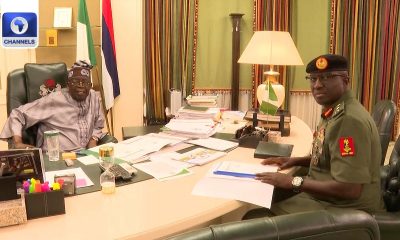News
Only 2.2% of Nigerians will benefit from new minimum wage – NBS report

Only 2.2% of Nigerians will benefit from new minimum wage – NBS report
About 2.2 per cent of the Nigerian population currently put at 229 million will benefit from a new minimum wage being negotiated, a report by the National Bureau of Statistics has shown.
Specifically, the new NBS report stated that 5.3 million of a total of 76 million workers (33.2 per cent of the total population) would benefit from the wage increase.
A back-of envelope calculation by the National Bureau of Statistics (NBS) shows that 1.2 million (23 per cent) and 0.3 million (six per cent) work with the federal government, drawing salaries from the Consolidated Revenue Fund, and government-owned enterprises respectively.
Also, another 1.3 million (25 per cent) and 0.7 million (13 per cent) work with the state governments, their agencies and local government areas. The remaining 1.8 million (34 per cent) work in formal private organisations.
While experts believe that civil and public servants deserve more in terms of their take home packages, they, nonetheless, observed that for the federal and subnational governments to address the wage crisis in the country, they have to do more in reducing the cost of living and provide enabling environment for businesses to thrive, which will in turn improve the livelihoods of millions of citizens that are wallowing in poverty.
And unlike in advanced societies, whatever civil servants earn in Nigeria will directly or indirectly be shared with the 66.8 per cent remaining population.
In developed societies, there are strong and sustainable safety nets for the people who are not working or have lost their jobs in order for them to have a decent life.
Also, the state takes care of people who have retired as they are seen as assets in society and not as liability to their families.
While there are agencies responsible for similar interventions here in Nigeria and other developing economies, they are far from the ideal.
Experts believe that many civil and public servants in Nigeria borrow or use other legal and dubious means to augment what they get as salary in order to meet up with the demand for the basic necessities of life such as food, shelter, health, education and transportation for their immediate and extended families.
The federal minimum wage, currently at N30,000, was last raised in 2019, when the inflation rate was between 11 and 12 per cent.
READ ALSO:
- Two IPOB/ESN terrorists shot dead in Enugu gun battle
- Abductors demand N20m for retired school principal’s release
- Man arrested with 8 human skulls in Ondo
However, the purchasing power of the naira has since been eroded by 276 per cent (compared to what it was in 2019), hence the clamour for an enhanced salary structure.
Nigeria among worse salary payers in Africa
Findings revealed that Nigeria is ranked 44th in Africa in terms of paying the lowest minimum wage, according to Professor Kemi Okuwa of the Nigerian Institute of Social and Economic Research (NISER). Analysis revealed that out of the 76 million workers in the country, only 5.3 million (6.9 per cent) work in the formal sector and are collecting wages.
The findings showed that this is the group that is likely to benefit most from a new minimum wage that has remained contentious and a source of discord between the federal, state and local governments on the one hand and the organised labour on the other hand.
Currently, there is a stalemate in the polity as the Nigeria Labour Congress (NLC) and the Trade Union Congress (TUC) have rejected the N62,000 minimum wage offered by the federal government, even as the Nigeria Governors Forum (NGF) and the Association of Local Governments of Nigeria (ALGON) said they could not afford to pay the figure.
Ironically, the organised labour said anything below N250, 000 would not serve as a living wage which Nigerian workers were aspiring to have.
Many pundits, including some members of the National Assembly, are suggesting that something in the range of N100,000 as minimum wage will uplift the lives of the working class without inducing additional inflation that will hurt the economy further.
Government and private sector workers
In his recent analysis, the Managing Director and Chief Economist of Analysts Data Services and Resources (ADSR), Dr Afolabi Olowookere, said regardless of how the recommendation in the new template for salaries might differ from what labour was currently asking for, both parties would find a common ground and in the final outcome there would be more money for labour.
He, however, said that when the labour finally “wins” the minimum wage battle, another thing that would remain obvious was in dissecting the discrepancy between current low-wage and high-wage workers; wage increase and productivity increase; and then cost of living and standard of living.
Olowookere said, “The implication is that the government will be the major institution that will pay the minimum wage. The private sector is largely informal.
READ ALSO:
- Major parts of Gaza facing famine-like conditions – WHO
- Gaza: US says ceasefire plan on course, cautions Hamas against proposed changes
- Decline reinstatement, follow your grandfather’s footsteps, Nyass family urges Emir Sanusi
“The question now is, when they benefit, others will also want to benefit from them, either because they are dependent on them or they are selling things to them.
“The major message is that even when we increase the salary for these few people, we should not lose sight of other people that are dependent on them, and the people that are unemployed; they are many and we don’t have unemployment benefits in Nigeria.
“What also happens to those in the informal sector, even though they are working, they are not earning the minimum wage. The only benefit they can derive is to increase prices of goods and services to the extent that they can squeeze out from those who have benefited.”
Dilemma of workers in states
Dr Olowookere also said that attention should be paid to states, especially given that some of them were not yet paying the N30,000 agreed during the last upward review, which he noted had expired.
He said, “The analysis of the states’ budget performance shows that most of them are using 100 per cent of IGR to pay salaries.
“If there is no Federal Account Allocation Committee (FAAC), they can’t pay salaries. So, if you increase wages, what will be the implication on their performance? How would states with low revenue cope?”
Findings revealed that 15 state governments are yet to implement the old wage of N30,000. They are Abia, Bayelsa, Delta, Enugu, Nasarawa, Adamawa, Gombe, Niger, Borno, Sokoto, Anambra, Imo, Benue, Taraba and Zamfara.
‘Reducing cost of living is the way out’
Speaking on the way forward, Dr Olowookere canvasses a sustainable solution of raising productivity and reducing cost of living for everyone.
READ ALSO:
- S’African soldier convicted of deliberately infecting girlfriend with HIV
- HoS suspends perm sec, orders probe over alleged sexual harassment
- Finland, EU shielding Simon Ekpa – Defence Chief
He said when the government continued to increase salaries without corresponding increase in productivity, the cost of living would also keep eroding whatever gain was recorded by the workers and Nigerians in general.
He said, “No doubt, Nigerian workers are due for minimum wage increase. At the current high inflation rate and low productivity level, with everyone being ‘forced’ to provide their own infrastructure, it is a matter of time before all gains are lost.”
FG, states, LGs must not politicise wages – Peterside
In a recent intervention, public policy analyst and former Director General (DG) of the Nigerian Maritime Administration and Safety Agency (NIMASA), Dakuku Peterside, said the implications of creating new salary structures and increasing the minimum wage were complex and multifaceted, requiring the careful consideration of various factors, including economic conditions, industry dynamics and social equity goals.
He said, “Our recent experience has shown that a salary increase may start a merry-go-round of cyclical inflation, which then eats up the value, and then we are back to where we started.
“In an economy with over 40 per cent food inflation, all stakeholders must apply caution and careful measures in implementing a new salary structure.
“However, governments (federal, state and local) cannot afford to play politics with the issue of ‘living wage.’”
Daily Trust
News
Akpabio sues Natasha for ₦200bn over sexual harassment allegations
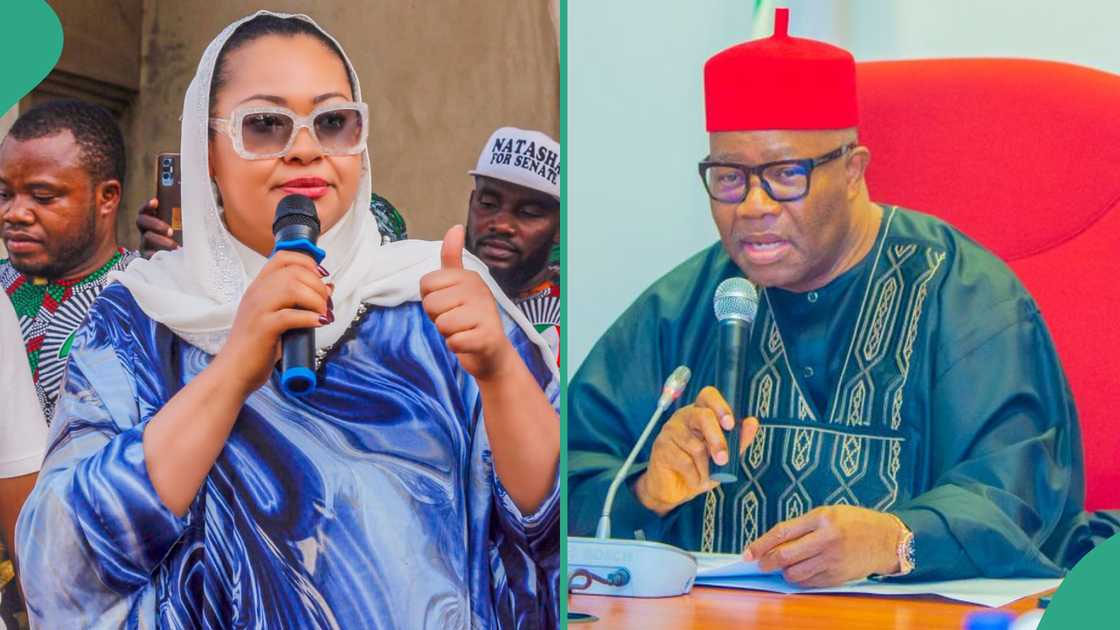
Akpabio sues Natasha for ₦200bn over sexual harassment allegations
Senate President Godswill Obot Akpabio has instituted a ₦200 billion defamation lawsuit against Senator Natasha Akpoti-Uduaghan, accusing her of spreading malicious sexual harassment allegations that he says have severely damaged his public image.
According to documents filed before the High Court of the Federal Capital Territory, Abuja, Akpabio is seeking substantial damages, public retractions, and nationwide broadcast apologies. He argues that Senator Akpoti-Uduaghan’s televised, radio, and online interviews portrayed him as a sexual predator who abused his office for personal gratification—claims he insists subjected him to widespread ridicule and reputational harm.
The lawsuit includes a comprehensive statement of claims and a list of witnesses. Akpabio is also asking the court to compel the removal of all online materials containing the disputed allegations and to order repeated public apologies across major media outlets.
READ ALSO:
- Nigeria joins global ICH elite as NAFDAC achieves full international regulatory Status
- Supreme Court Strikes Out Osun Suit on Withheld Local Govt Allocations
- DSS Arrests Doctor Providing Medical Support to Bandits in Kwara State
A court order issued on 6 November 2025 granted permission for substituted service through the Clerk of the National Assembly after initial attempts to reach Senator Akpoti-Uduaghan directly were unsuccessful. The case is now moving forward and is expected to become one of the most closely watched political legal battles in Nigeria.
Responding on 5 December 2025, Senator Natasha Akpoti-Uduaghan confirmed receipt of the suit and expressed readiness to defend her allegations before a competent court. She stated that she had previously been prevented from presenting a petition before the Senate Committee on Ethics and Privileges due to claims that a related case was already in court—an action she believes protected the Senate President from legislative scrutiny.
In a strongly worded response, the Kogi Central senator maintained that the court proceedings will finally provide the platform to substantiate her claims. She reiterated her stance that she experienced sexual harassment and that her refusal to comply with the alleged advances prompted sustained political retaliation.
“See you in court, Godswill Akpabio,” she declared.
Akpabio sues Natasha for ₦200bn over sexual harassment allegations
News
NLC threatens nationwide protests as insecurity worsens, withdraws support for Labour Party
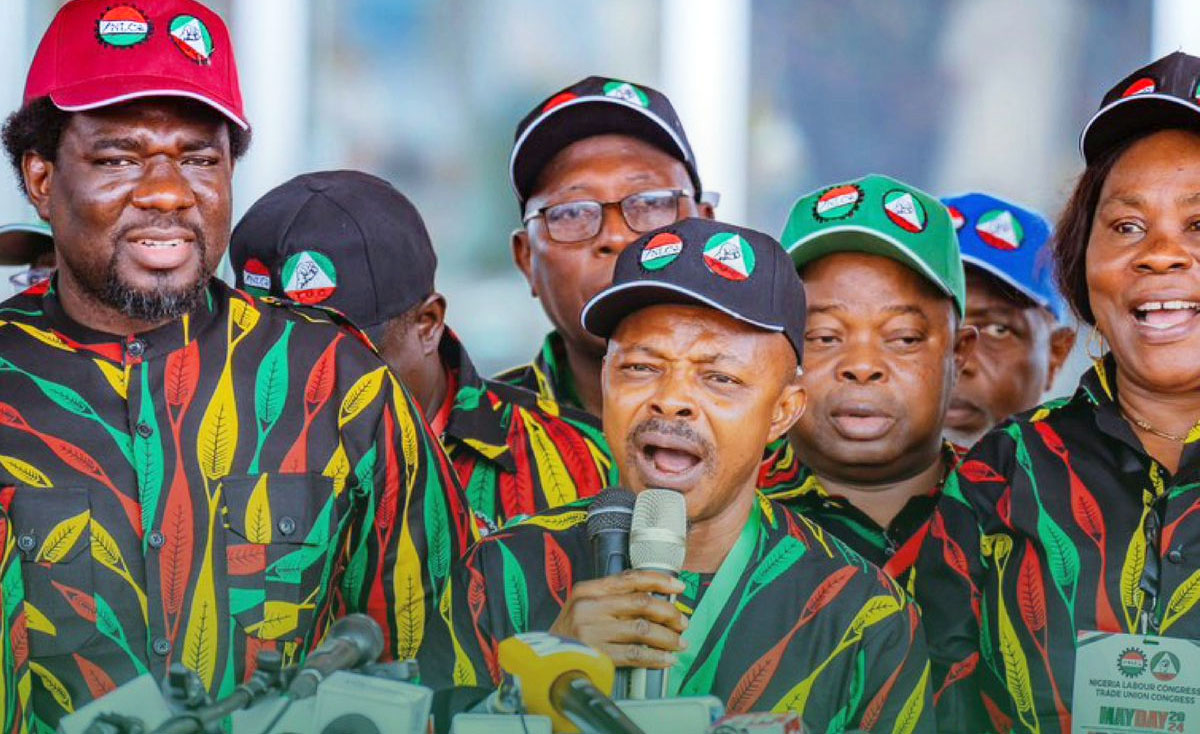
NLC threatens nationwide protests as insecurity worsens, withdraws support for Labour Party
The Nigeria Labour Congress (NLC) has warned that it will no longer remain passive as criminal gangs intensify violent attacks across the country, declaring its readiness to hold a national day of mourning and mobilise nationwide protests over the escalating insecurity in Nigeria.
Speaking at the opening of the NLC’s National Executive Council (NEC) meeting in Lagos, NLC President Joe Ajaero said the country was “under siege,” condemning the latest school kidnapping and the reported withdrawal of security personnel before the attack. He demanded a full investigation to expose any possible compromise within the nation’s security architecture.
“The NLC cannot stand idly by and allow criminals to take over our country—never again. We want to know who ordered the withdrawal of security operatives from that school. We will not allow kidnappers and bandits to overrun our nation,” Ajaero said.
READ ALSO:
- Oshiomhole Seeks Tougher Regulation of Fintech Firms After Cyber Fraud Experience
- Boris Johnson Hails Kemi Badenoch as “Future UK Prime Minister” During Visit to Nigeria
- A troubling message from Guinea-Bissau, by Azu Ishiekwene
He stressed that the labour movement would soon announce details of the planned protests and national mourning, insisting the lives of teachers, students and workers were in grave danger. “It is getting out of hand. We can no longer bear this,” he added.
Ajaero also revealed that the NLC had withdrawn its representatives from the Labour Party, accusing them of pursuing personal interests rather than representing workers.
Human rights lawyer Femi Falana, SAN, who addressed the meeting, warned that the country was in “serious trouble” over rising kidnappings and attacks. He rejected calls for foreign military intervention, cautioning that such a move would undermine Nigeria’s sovereignty.
Falana criticised recent statements by former U.S. President Donald Trump, describing them as unacceptable. He urged President Bola Tinubu to take decisive action to protect citizens, saying: “We want to let the world know that we are not a conquered people.”
He called on labour unions, civil society organisations and Nigerians to prepare to resist any further decline in national security.
NLC threatens nationwide protests as insecurity worsens, withdraws support for Labour Party
News
Boris Johnson Hails Kemi Badenoch as “Future UK Prime Minister” During Visit to Nigeria

Boris Johnson Hails Kemi Badenoch as “Future UK Prime Minister” During Visit to Nigeria
Former British Prime Minister Boris Johnson has praised UK Conservative Party leader Kemi Badenoch, describing her as a “future Prime Minister of the United Kingdom” during his visit to Nigeria for the Imo State Economic Summit 2025.
Speaking in Owerri, Imo State, on Thursday, Johnson commended Governor Hope Uzodimma for his efforts to boost economic development and improve security, noting that he felt “perfectly safe” despite earlier warnings about Nigeria’s security situation.
Johnson highlighted the state government’s push to deliver 24-hour electricity, stressing that reliable power and clean, sustainable energy are essential for economic growth as the world moves into an Artificial Intelligence (AI)-driven future.
READ ALSO:
- A troubling message from Guinea-Bissau, by Azu Ishiekwene
- Siyan Oyeweso: Lessons in virtue and vanity
- Court Rules Only Lawyers Can Represent Nnamdi Kanu, Rejects Brother’s Appearance
He also emphasized the strong historical and economic ties between Nigeria and the United Kingdom, praising the exchange of goods, services, and highly skilled professionals between both countries.
In a humorous remark that sparked applause, Johnson said: “We send you former UK prime ministers, and you send us future UK prime ministers in the form of Kemi Badenoch.”
The summit, attended by Vice President Kashim Shettima, former UN Secretary-General Ban Ki-moon, business mogul Aliko Dangote, and other top government and private-sector leaders, focused on strategies to accelerate Imo State’s economic transformation.
Boris Johnson Hails Kemi Badenoch as “Future UK Prime Minister” During Visit to Nigeria
-
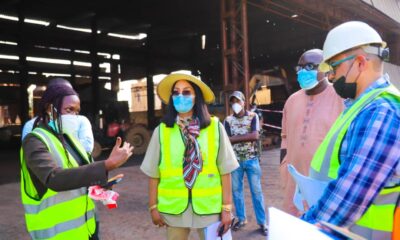
 metro3 days ago
metro3 days agoSenate Launches Emergency Probe into Widespread Lead Poisoning in Ogijo, Lagos/Ogun
-

 Auto3 days ago
Auto3 days agoCourt of Appeal Affirms Ruling Barring VIO from Seizing Vehicles or Fining Motorists
-

 Sports1 day ago
Sports1 day ago2026 FIFA World Cup Draw: England Draw Croatia as Brazil Face Morocco in Tournament Opener
-

 News3 days ago
News3 days agoUS authorities arrest Nigerian CEO Cashmir Chinedu Luke for alleged $7m VA fraud
-

 metro3 days ago
metro3 days agoFG secures release of three Nigerians detained in Saudi Arabia
-

 News1 day ago
News1 day agoAkpabio sues Natasha for ₦200bn over sexual harassment allegations
-
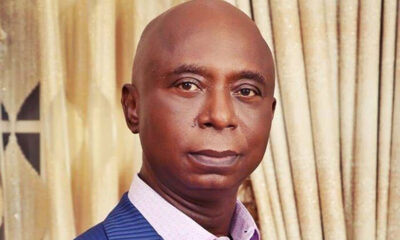
 metro3 days ago
metro3 days agoNed Nwoko vows legal action against rising online harassment, criminal defamation
-

 metro2 days ago
metro2 days agoTinubu Govt Eliminates More Terrorists Than Previous Administrations — Fani-Kayode









